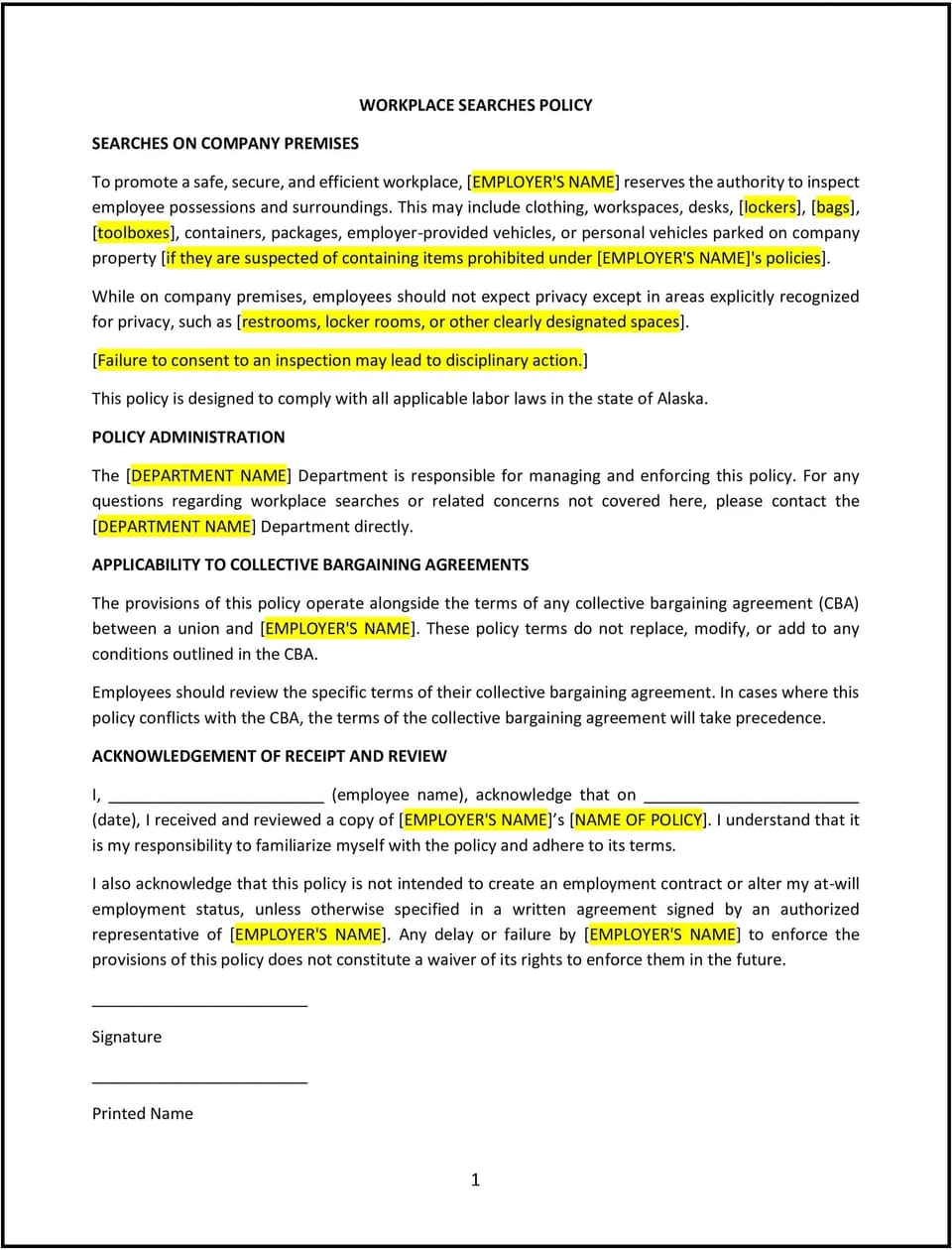Workplace searches policy (Alaska): Free template

Workplace searches policy (Alaska)
In Alaska, a workplace searches policy outlines guidelines for conducting searches of company property, employee belongings, or workspaces to maintain safety, security, and compliance with company policies. This policy ensures transparency, protects employee privacy, and provides a structured approach for addressing concerns such as theft, prohibited items, or policy violations. By implementing this policy, businesses can reduce risks while fostering trust.
How to use this workplace searches policy (Alaska)
- Define scope of searches: Clearly outline what may be searched, such as desks, lockers, vehicles on company property, and electronic devices owned by the company.
- Include circumstances for searches: Specify situations that may warrant a search, such as suspected theft, possession of prohibited items, or safety concerns.
- Address employee rights: Emphasize that searches will respect employee privacy to the extent possible while maintaining workplace safety and security.
- Establish authorization procedures: Require searches to be authorized by designated personnel, such as HR or senior management, to ensure consistency.
- Communicate search protocols: Provide clear instructions on how searches will be conducted, ensuring they are non-discriminatory and adhere to legal requirements.
Benefits of using a workplace searches policy (Alaska)
A workplace searches policy provides several advantages for businesses in Alaska. Here’s how it helps:
- Enhances security: Prevents theft, ensures compliance with company policies, and addresses safety risks.
- Protects employee rights: Balances the company’s need for security with employees’ expectations of privacy.
- Promotes fairness: Establishes clear and consistent procedures for conducting workplace searches.
- Reduces liability: Ensures searches are conducted in compliance with state and federal laws, minimizing legal risks.
- Builds trust: Provides transparency about when and how searches may occur, fostering a culture of accountability.
Tips for using a workplace searches policy (Alaska)
- Tailor to industry needs: Address specific search considerations relevant to your industry, such as safety protocols for hazardous materials or regulated items.
- Provide training: Educate managers and authorized personnel on conducting searches respectfully and in compliance with legal standards.
- Use clear communication: Include this policy in employee handbooks and discuss it during onboarding to ensure all employees understand the guidelines.
- Document searches: Keep detailed records of all searches conducted, including the reason, authorization, and outcomes, to maintain accountability.
- Update regularly: Revise the policy as needed to reflect changes in workplace dynamics, legal requirements, or industry best practices.
Q: How should I determine when a workplace search is necessary?
A: Conduct searches only when there is reasonable suspicion of theft, safety concerns, possession of prohibited items, or policy violations, and document the justification.
Q: What steps should I follow to ensure a search is compliant?
A: Obtain prior authorization from HR or senior management, ensure searches are non-discriminatory, and conduct them respectfully and professionally.
Q: How can I balance employee privacy with workplace security?
A: Limit searches to company property or specific items relevant to the concern and avoid unnecessary invasions of personal belongings.
Q: Who should conduct workplace searches?
A: Searches should be conducted by trained personnel authorized by the company to ensure consistency and professionalism.
Q: How often should this policy be reviewed?
A: Review the policy annually or whenever changes occur in legal requirements, workplace dynamics, or company practices.
This article contains general legal information and does not contain legal advice. Cobrief is not a law firm or a substitute for an attorney or law firm. The law is complex and changes often. For legal advice, please ask a lawyer.


